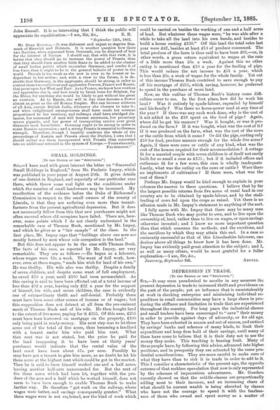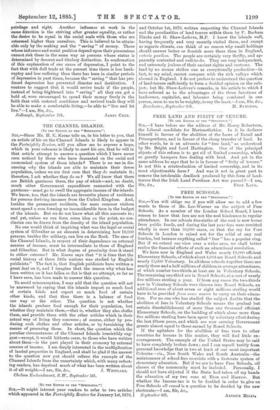DEPRESSION IN TRADE.
[To THE EDITOR OF THE " SPECTATOR."] SIR,—It may seem paradoxical to ascribe in any measure the present depression in trade to increased thrift and providence on the part of the people; yet an influence that is unmistakeably at work in checking enterprise and minimising individual ex- penditure in small communities may have a large share in pro- ducing the stiffness and limitation in trade that are experienced throughout the country. For long years the industrial classes and small traders have been encouraged to "save" their money in order to provide against days of adversity, or for old age. They have been exhorted in season and out of season, and enticed by savings' banks and schemes of many kinds, to limit their expenditure and keep firm hold of their savings, until many of them have come to believe that it is their duty not to use the money they make. This teaching is bearing fruit. Many of these people have, by following this advice, advanced into higher positions, and in prosperity they are actuated by the same pru- dential considerations. They are more careful to make sure of what they have than to risk it in trade in order to add to it. This I consider a characteristic of the present age, the opposite extreme of that reckless speculation that now is only represented by the schemes of impecunious adventurers. Mr. Goschen recently showed us that the middle-classes are proportionally adding most to their incomes, and an increasing share of what should be current wealth is being absorbed by classes who have not the courage to spend it with the fearless- ness of those who owned and spent money as a matter of
privilege and right. Another influence at work in the same direction is the striving after greater equality, or rather the desire to be equal in the social scale with those who are esteemed higher than ourselves. This is believed to be attain- able only by the making and the " saving " of money. Those whose influence and social position depend upon their possessions cannot risk these in the same way as persons whose status is determined by descent and titulary distinction. In confirmation of this explanation of one cause of depression, I point to the fact that with dull trade at the present time there is less bank- ruptcy and less suffering than there has been in similar periods of depression in past times, because the " saving " that has pro- duced depression has prevented disaster and destitution. I venture to suggest that it would revive trade if the people, instead of being frightened into " saving" all they can get a hold of, were encouraged to spend their money freely in the faith that with restored confidence and revived trade they will be able to make a comfortable living,—be able to " live and let live."—I am, Sir, &c.,



































 Previous page
Previous page